Specialties
Fetal Medicine
Fetal Medicine at Nectar Mother and Child Care Hospital focuses on monitoring and ensuring the health of both mother and baby throughout pregnancy. Using advanced screenings, detailed fetal scans, and expert interventions, we detect and manage potential complications early. Our specialized team provides personalized care for both routine and high-risk pregnancies, ensuring the best possible outcomes.
Advanced Care for Your Baby Before Birth
At Nectar Mother and Child Care Hospital, we believe that a baby’s health begins long before birth. Our Fetal Medicine Department is dedicated to ensuring the well-being of both mother and baby through advanced prenatal screening, early detection of abnormalities, and expert medical intervention. With the latest diagnostic technology and a team of highly skilled fetal medicine specialists, we provide comprehensive care for all stages of pregnancy, including routine monitoring and high-risk pregnancies.
Whether you need a detailed fetal scan, genetic testing, or specialized intervention, our experts are here to guide you at every step, ensuring the best possible outcomes for you and your baby.
Early Pregnancy Scans
The first trimester is crucial for confirming pregnancy viability and identifying any early complications. Our early pregnancy scans help:
- Confirm fetal heartbeat and growth
- Detect ectopic pregnancy or miscarriage risks
- Estimate due date accurately
- Assess multiple pregnancies (twins/triplets)
NT/NB Scan (Nuchal Translucency & Nasal Bone Scan)
Performed between 11-14 weeks, this scan assesses chromosomal abnormalities like Down syndrome, Edwards syndrome, and Patau syndrome. It measures fluid accumulation behind the baby’s neck (NT) and the presence of the nasal bone (NB) to evaluate genetic risks.
Anomaly Scan (Targeted Imaging for Fetal Abnormalities)
A detailed ultrasound at 18-22 weeks that examines the baby’s organs, limbs, brain, spine, heart, and facial features to rule out structural abnormalities. This scan helps:
- Detect congenital conditions like cleft lip, spina bifida, and heart defects
- Monitor amniotic fluid levels and placental health
- Identify any early signs of complications
Fetal Echocardiography
This specialized scan evaluates the baby’s heart structure and function to detect congenital heart diseases. It is particularly recommended for:
- Pregnancies with a family history of heart defects
- Mothers with diabetes, infections, or autoimmune disorders
- Cases of fetal growth restrictions or abnormal heart rates
Growth & Doppler Scans
Doppler ultrasound assesses blood flow to the baby and placenta, ensuring the baby is growing well. This scan is vital in cases of:
- High-risk pregnancies (hypertension, gestational diabetes, preeclampsia)
- Fetal growth restriction (IUGR)
- Twins or multiple pregnancies
Invasive Procedures (Amniocentesis & CVS)
For expectant mothers at risk of genetic disorders, we offer:
- Amniocentesis (15-20 weeks) – Testing amniotic fluid for genetic abnormalities
- Chorionic Villus Sampling (CVS) (10-14 weeks) – Early detection of chromosomal conditions like Down syndrome
Fetal Interventions & High-Risk Pregnancy Care
Our fetal medicine experts collaborate with obstetricians and neonatologists to manage high-risk pregnancies with specialized interventions, including:
- Intrauterine blood transfusions for anemia or Rh incompatibility
- Fetal shunt procedures for abnormalities in the baby’s chest or kidneys
- Laser therapy for twin-to-twin transfusion syndrome (TTTS)
Other Services
Our Fetal Medicine Expert
Experienced fetal medicine experts ensuring the health and well-being of both mother and baby through advanced prenatal care.
Dr. Suprabhath H N
MBBS, DNB, DMRD, Fellowship in Fetal Medicine
Consultant Fetal Medicine Specialist
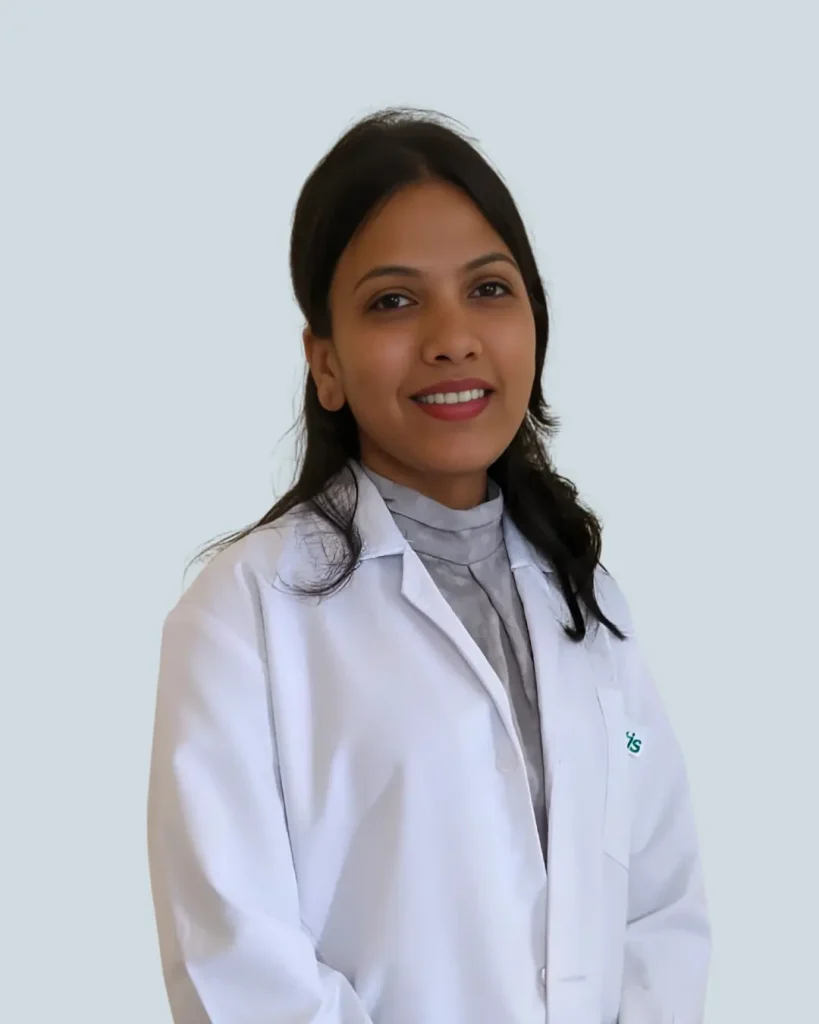
Patient Testimonials
Why Everyone Loves Us
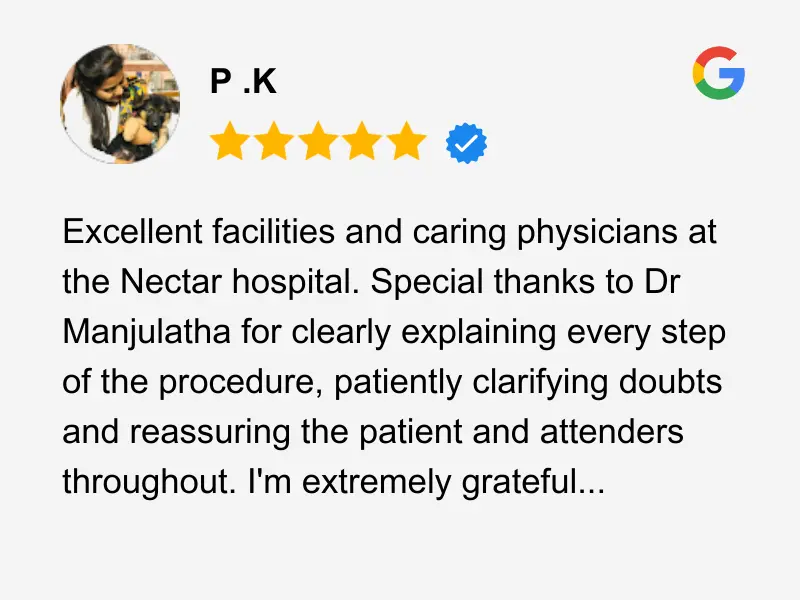
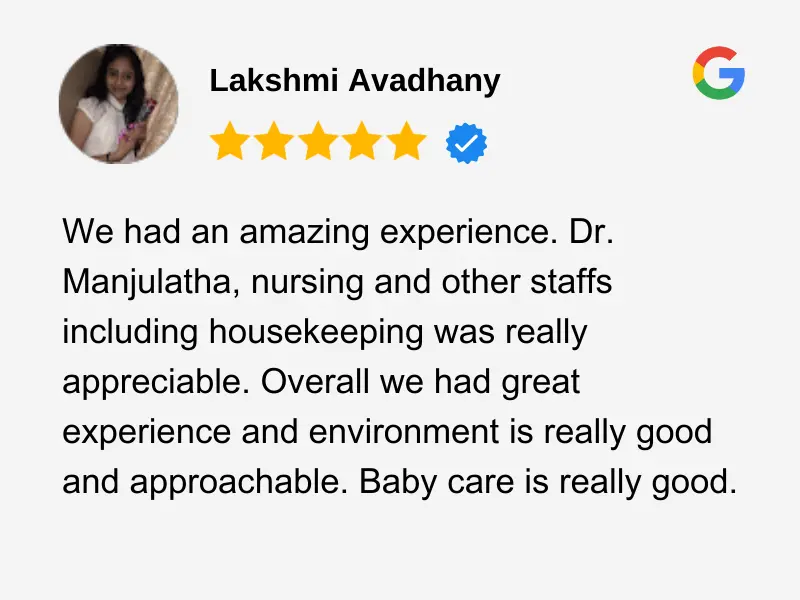
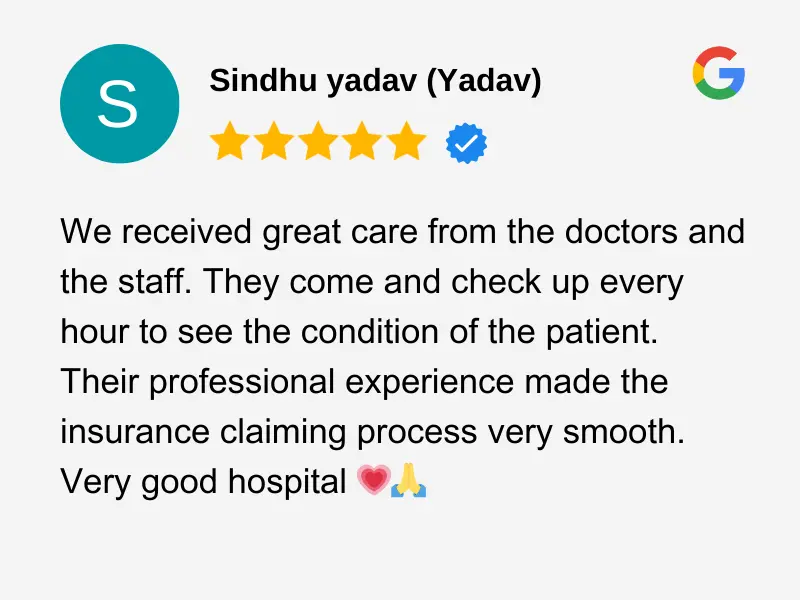

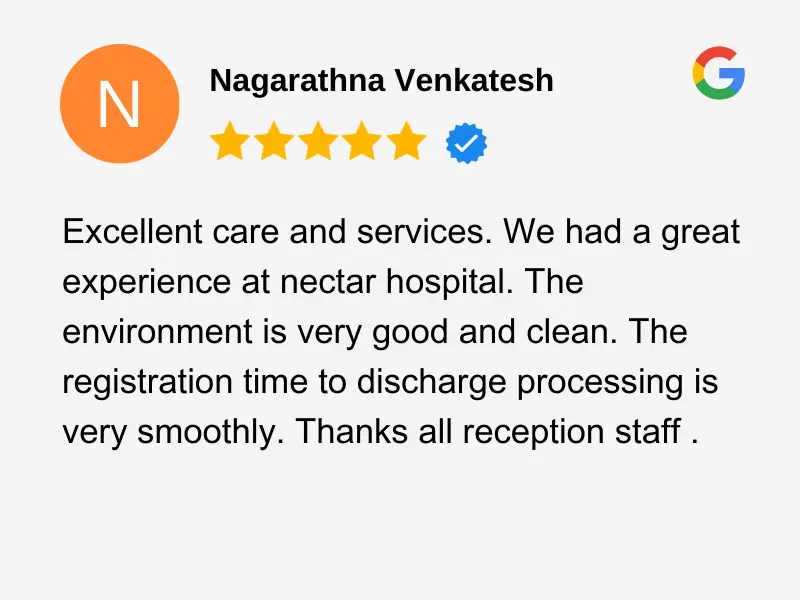

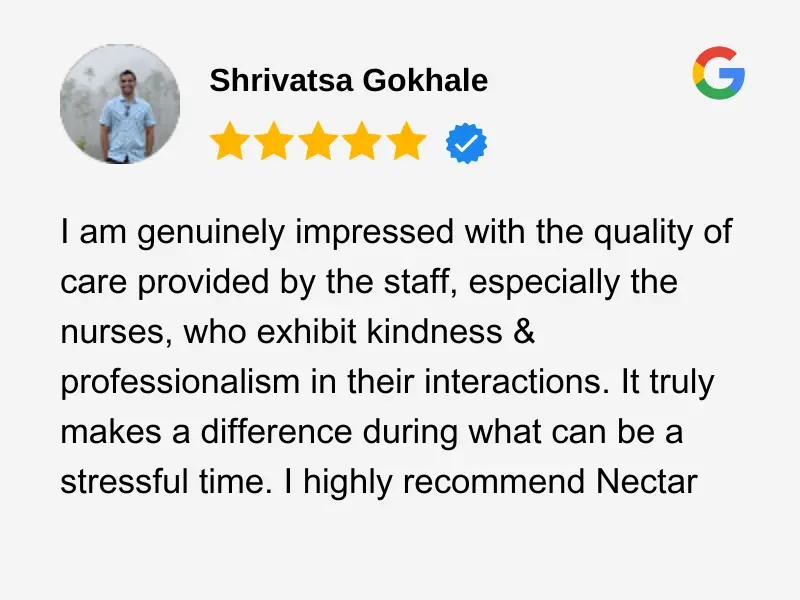

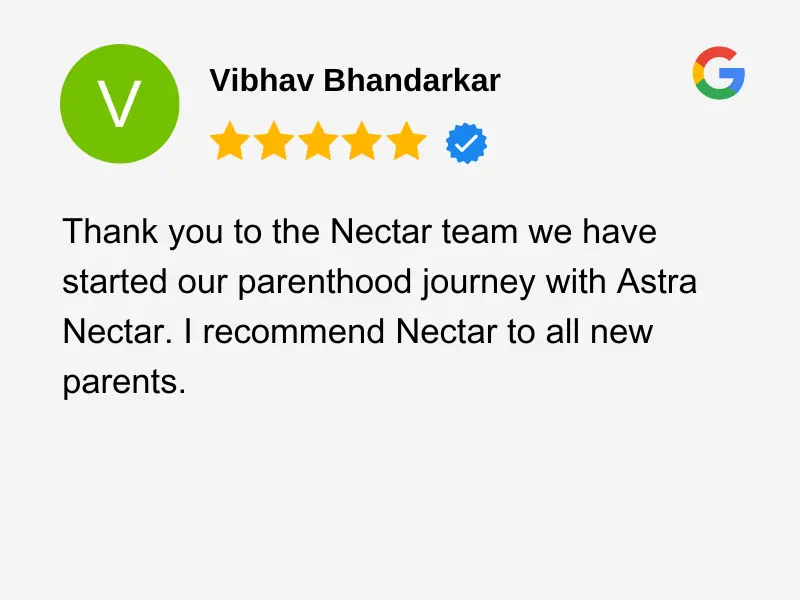
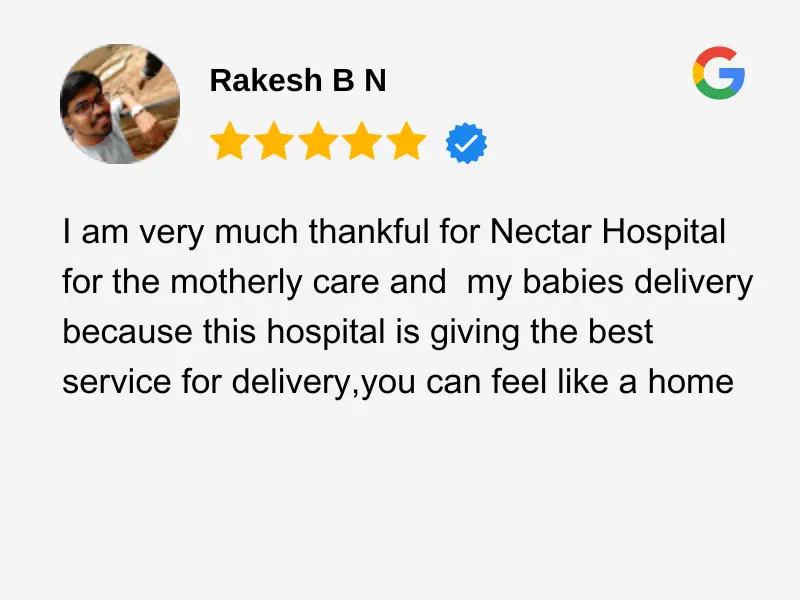
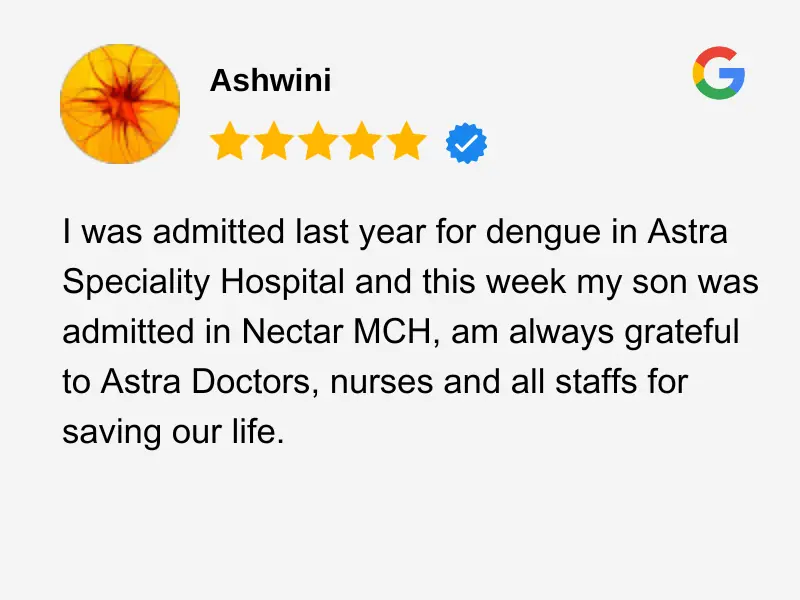
Why Us
Why Choose Nectar MCH
At Nectar Mother and Child Care Hospital, we are dedicated to providing high-quality care for women, mothers, and children.
Everything Under One Roof
From consultation, diagnostics, treatment to nutritious meals designed for mothers and patients, we provide complete care in one place for a seamless and stress-free healthcare experience.
Excellent Care from the Moment You Step in
From the warm welcome at reception to expert medical guidance, our dedicated team ensures you feel supported, safe, and cared for at every stage of your journey.
Ultra Clean, Spacious & Comfortable Rooms
Designed for quick recovery and comfort for mothers, babies, and families, our staff maintains highest standards of cleanliness and hygiene ensuring you have an exception time at Nectar MCH.
Cashless Insurance & Easy Payments
We offer hassle-free billing, accept major insurance providers from India and offer various payment methods like UPI, Credit Cards etc. to ensure stress-free access to quality healthcare.
Why Us
Why Choose Nectar MCH
At Nectar Mother and Child Care Hospital, we are dedicated to providing high-quality care for women, mothers, and children.
Everything Under One Roof
From consultation, diagnostics, treatment to nutritious meals designed for mothers and patients, we provide complete care in one place for a seamless and stress-free healthcare experience.
Excellent Care from the Moment You Step in
From the warm welcome at reception to expert medical guidance, our dedicated team ensures you feel supported, safe, and cared for at every stage of your journey.
Ultra Clean, Spacious & Comfortable Rooms
Designed for quick recovery and comfort for mothers, babies, and families, our staff maintains highest standards of cleanliness and hygiene ensuring you have an exception time at Nectar MCH.
Cashless Insurance & Easy Payments
We offer hassle-free billing, accept major insurance providers from India and offer various payment methods like UPI, Credit Cards, etc., to ensure stress-free access to quality healthcare.
FAQ's
Frequently Asked Questions
Find answers to common fetal medicine related questions here.
What is fetal medicine, and why is it important?
Fetal medicine is a specialized field that focuses on monitoring and managing the health of the baby before birth. It helps detect and manage birth defects, genetic conditions, and fetal growth issues to ensure a safe pregnancy and delivery.
When should I consult a fetal medicine specialist?
You may need to see a fetal medicine specialist if you have:
A high-risk pregnancy (e.g., advanced maternal age, diabetes, hypertension)
Abnormal ultrasound findings
A history of genetic disorders in the family
Multiple pregnancies (twins, triplets, etc.)
Concerns about fetal growth or abnormalities
What tests are included in fetal medicine?
Fetal medicine includes:
Ultrasound scans (NT scan, anomaly scan, growth scans)
Non-invasive prenatal testing (NIPT) for genetic screening
Amniocentesis and chorionic villus sampling (CVS) for genetic disorders
Doppler studies to check fetal blood flow and oxygen supply
What is an anomaly scan, and when should I get it?
An anomaly scan (TIFFA scan) is a detailed ultrasound done between 18–22 weeks to check for any structural abnormalities in the baby’s brain, heart, spine, limbs, and other organs.
What is the difference between NIPT and amniocentesis?
NIPT (Non-Invasive Prenatal Testing) is a simple blood test that detects genetic conditions like Down syndrome without any risk to the baby.
Amniocentesis involves taking a sample of amniotic fluid for more detailed genetic testing but carries a small risk of complications.
Can fetal medicine help detect genetic disorders in my baby?
Yes, genetic testing and screenings in fetal medicine can help identify conditions like Down syndrome, thalassemia, spina bifida, and congenital heart defects, allowing early intervention if needed.
What happens if an abnormality is detected in my baby?
If an abnormality is found, the fetal medicine team will discuss the condition, possible treatments, and management options. In some cases, intrauterine procedures or early delivery may be recommended.
What is fetal echocardiography, and when is it needed?
Fetal echocardiography is a specialized ultrasound that checks the baby’s heart structure and function. It is recommended if there is:
A family history of congenital heart defects
Diabetes or infections during pregnancy
Abnormal findings in previous ultrasounds
Are there treatments available if my baby has a medical condition before birth?
Yes, some conditions can be treated before birth using fetal surgery, intrauterine transfusions, or medication given to the mother to support the baby’s health.
What are Doppler studies in fetal medicine?
Doppler ultrasound checks blood flow in the umbilical cord, placenta, and baby’s brain and heart to ensure the baby is getting enough oxygen and nutrients. It is essential for high-risk pregnancies or if there are concerns about fetal growth.
Can fetal medicine help in managing twin or multiple pregnancies?
Yes, fetal medicine specialists closely monitor twins, triplets, or higher-order pregnancies to detect complications like twin-to-twin transfusion syndrome (TTTS) and ensure healthy growth for all babies.
How often should I have fetal medicine check-ups during pregnancy?
For low-risk pregnancies, routine fetal medicine scans are done at 12, 20, and 32 weeks. If you have a high-risk pregnancy, more frequent monitoring may be needed based on your doctor’s recommendations.
